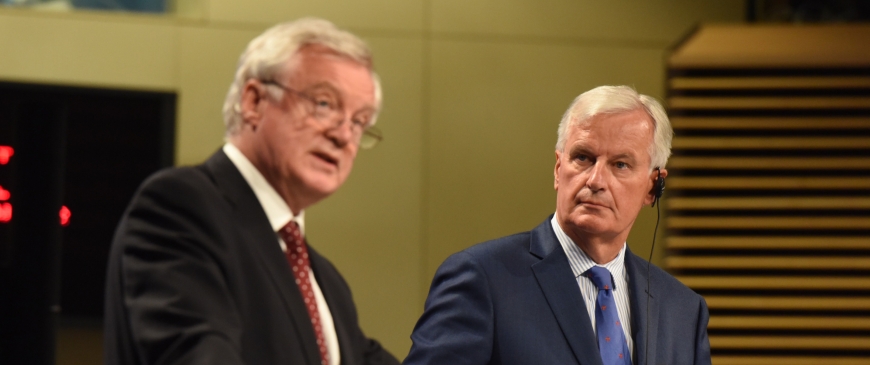
A potential Brexit landing point moves slowly into view?
Something like single market membership for goods would go a way to solving the Irish issue.
Amid all the chaos and confusion, is a possible Brexit landing point moving into view? It appears that Theresa May is inching towards pushing for a post-Brexit relationship that would see the UK remain in the European Union’s single market for goods, VAT area and customs union—while leaving the single market for services and ending the free movement of people. We at the Centre for European Reform have called this the Jeresy option, as it replicates to some extent the arrangement the Channel Islands have with the EU.
Such a relationship would see the UK free to legislate and strike trade deals in the area of services (and suffer the consequence of reduced access to EU markets as a result). It would avoid the need for checks at the UK’s borders on goods going back and forth to the EU, reducing the risk of some of the feared negative impacts of Brexit such as queues of trucks backing up from Dover. And most importantly it would ensure there would be no need for physical infrastructure on the Northern Irish/Ireland land border.
Assuming the prime minister does actually want this, and can get it signed off by her cabinet (which recent reports suggest is far from a given), will the EU agree to it.
The answer is probably not. But bear with me.
While, from a mercantilist point of view, the Jersey option has its appeal—it would protect the EU’s trade surplus in goods with the UK while reducing access to the UK’s services industry—the fear that allowing such an option would undermine the integrity of the single market reigns supreme. Arguments that (minus a customs union and VAT) the EU has already allowed the Swiss a similar relationship will hold little water; the EU doesn’t like the Swiss relationship and isn’t keen to make the same mistake again. It should also be noted that the Swiss are required to accept freedom of movement as a condition for their partial membership of the single market, something the UK is reluctant to do.
There is also a legitimate fear that the increasing interdependence of services and goods, where the value of a manufactured product may be largely derived from its services inputs, makes the carving out of goods increasingly problematic. The EU worries that parts of a potentially deregulated UK services industry would continue, in practice, to benefit from unconstrained access to the EU’s market without the associated obligations.
Some in the UK will claim the EU is being hypocritical. The Jersey option is pretty much what the EU has proposed for Northern Ireland as an insurance policy, to come into effect if the future EU-UK relationship fails to prevent the need for infrastructure and checks at the border. Indeed, Commission representatives openly acknowledge that the offer on the table for Northern Ireland amounts to so-called cherry-picking. What such criticism misses is that the EU has always been flexible when it comes to small nations in and around its territory, particularly if a lack of flexibility throws up existential issues for one of its members (in this case, Ireland). It would be wrong to assume that this flexibility will be extended to the whole of the UK.
If the UK wants to land something close the Jersey option, rather than confronting the EU on its fundamental principles (the inseparability of the four freedoms), it perhaps needs to be more subtle.
The EU is willing to countenance the idea of the UK-EU post-Brexit customs union. Yet in and of itself, other than making a zero tariff rate for the goods traded between the EU and UK unconditional (a free trade agreement requires an exporter to demonstrate its product has enough local value added in order to qualify for the zero tariff rate) a customs union does pretty much nothing to alleviate checks at the border. Addressing, and removing the need for checks requires alignment on regulation and standards. This is why, for example, the EU-Turkey customs union builds regulatory commitments into the agreement. Perhaps, with a customs union on the table the UK could also make some progress in the regulatory space, without ever mentioning the single market. Perhaps.
Even then, it is difficult to see how the UK gets all the way to Jersey, and the frictionless border it promises, without softening—or even rubbing out entirely—its red-lines on European Court of Justice oversight (or at least accepting a proxy) and, particularly on freedom of movement.
But if that were to happen, and the UK political debate would need to shift massively for this to be the case, it then begs a further question: why not just go the whole hog and stay in the single market in its entirety?
Regardless of whether softer UK positions are negotiable with the EU, the gradual UK shift (subject to terms and conditions/Jacob Rees Mogg) towards a continued, deep post-Brexit relationship with the EU should be welcomed, and while it is unlikely the EU will accept Jersey, for the sake of maintaining this mutually beneficial direction of travel, it would be advised to be delicate in its rejection.
Sam Lowe is a research fellow at the Centre for European Reform.
